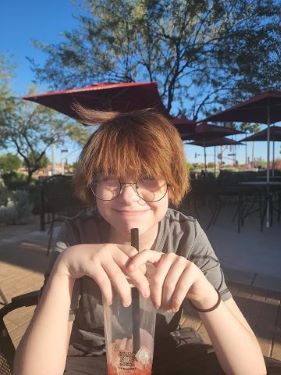
Just a few decades ago, children born with cystic fibrosis had a life expectancy of less than 15 years. Today, thanks to improved medical care and groundbreaking treatments, life expectancy for cystic fibrosis – commonly called CF – has improved dramatically. In fact, there are now more adults living with CF than children.
A rare genetic disease linked to mutations in the CFTR gene, CF causes mucus in various organs to become thick and sticky. In the lungs, the mucus can block the airway and trap bacteria, leading to serious breathing problems and respiratory infections. CF also can affect the digestive or gastrointestinal (GI) system, as mucus blocks important digestive enzymes that help the body absorb vital nutrients and lead to malnutrition. Failure to thrive is a significant concern.
Toby, 13, has struggled with both respiratory and severe GI symptoms since birth. But with the ongoing care and support of the pediatric Cystic Fibrosis (CF) Program at Phoenix Children’s, the teenager is thriving. One of only two CF programs in Arizona accredited by the Cystic Fibrosis Foundation (CFF), the program cares for more than 200 pediatric CF patients and offers the latest evidence-based treatments and therapies for kids with CF.
Cutting-Edge Therapies Change Lives
For Toby, some of these treatments have been life changing. Several years ago, he started taking a new medication for people with specific genetic mutations that combines three CF medications to more effectively target the primary defect in CF (known as CFTR dysfunction). The drug not only helps maintain Toby’s lung function, it also helps his digestive system absorb nutrients and vitamins. Since starting the therapy, he has gained 30 pounds.
“This year, Toby had his first full year in school since second grade. He’s now in seventh grade, and it is going really well,” says his mother, Erin. “Up until now, his education has been piecemeal because he’s been sick, so we’ve done homeschool, virtual, tutors. But he has As and Bs in all of his classes. We’re astounded that he’s made it through the entire year.”
A Multidisciplinary Approach to CF Care
Phoenix Children’s CF program includes multidisciplinary clinics that provide convenient, coordinated care to monitor patients and identify any issues early. Patients see a variety of health care providers in a single visit, including a pulmonary doctor, nurse practitioner, dietitian, psychologist, social worker and respiratory therapist who does lung function testing. They may see other specialists such as endocrinologists and GI doctors, as needed.
“CF is a very different disease than it was 20 years ago. It’s more about maintaining health rather than just treating illness, but it’s still very much an intensive disease that requires regular therapies and visits to maintain health,” says Phoenix Children’s pediatric pulmonology specialist Michelle “Mia” Ratkiewicz, DO, who cares for Toby. “We adhere to Cystic Fibrosis Foundation recommendations to see patients four times a year, even for stable and healthy patients, because monitoring lung function, labs, respiratory cultures and growth are important to maintaining good health in kids with CF.”
Teaching Kids to Take Charge of Their Health
When pediatric CF patients reach adulthood, their care often continues through Phoenix Children’s Adult Cystic Fibrosis Program.
However, making that transition from pediatric to adult care can be challenging. Phoenix Children’s participates in CF Rise, a Cystic Fibrosis Foundation program developed to help kids learn to manage their care and advocate for themselves as they move out of pediatric care.
“What used to happen – when kids turned 18 or 19 and some of our capabilities as a children’s hospital ended – it kind of took them by surprise,” explains Sophia Williams, MD, a pediatric pulmonology specialist. “It’s important that the kids are ready to take on the responsibilities of their care and that parents are ready to let go.”
CF Rise is a structured program that providers try to include in every CF Clinic visit starting around age 10. Patients complete modules and assessments online or on paper to measure their understanding of their disease and to help them learn how to manage their appointments, treatments and challenges.
“When patients are between the ages of 18 to 21 and their scores indicate they are ready to transition, our pediatric team makes an official handoff to the adult team,” says Dr. Williams. “The program really helps families and caregivers prepare for transition at a gradual pace and makes it easier when that transition needs to happen.”
For Erin Fortner, CF Rise has meant seeing Toby take on more responsibility for his health. “It’s a hugely important program,” says Erin Fortner. “Toby knows how to take his meds and why he’s taking them, and how to put his nebulizer [breathing device] together on his own. And he’s able to talk to his doctors and care team instead of going through me.”
Partnering to Keep Patients Healthy for Life
Erin and Toby are grateful for the expertise and support of their Phoenix Children’s team. “They have made this a collaborative process from the very beginning and have been supportive of whatever we had to do to keep Toby healthy,” Erin says. “They really meet Toby where he’s at and individualize treatment to him.”
“We are so excited about the progress that has been made in CF care, and we see ourselves as partners who want to keep our patients healthy and thriving,” says Dr. Ratkiewicz. “It requires ongoing care, and follow-up is so important. The majority of our patients leave the pediatric clinic with normal lung function and go on to college, full-time jobs and have careers and families – things that wouldn’t have been expected for many people with CF even 20 years ago.”
To learn more about our Cystic Fibrosis program, click here.
